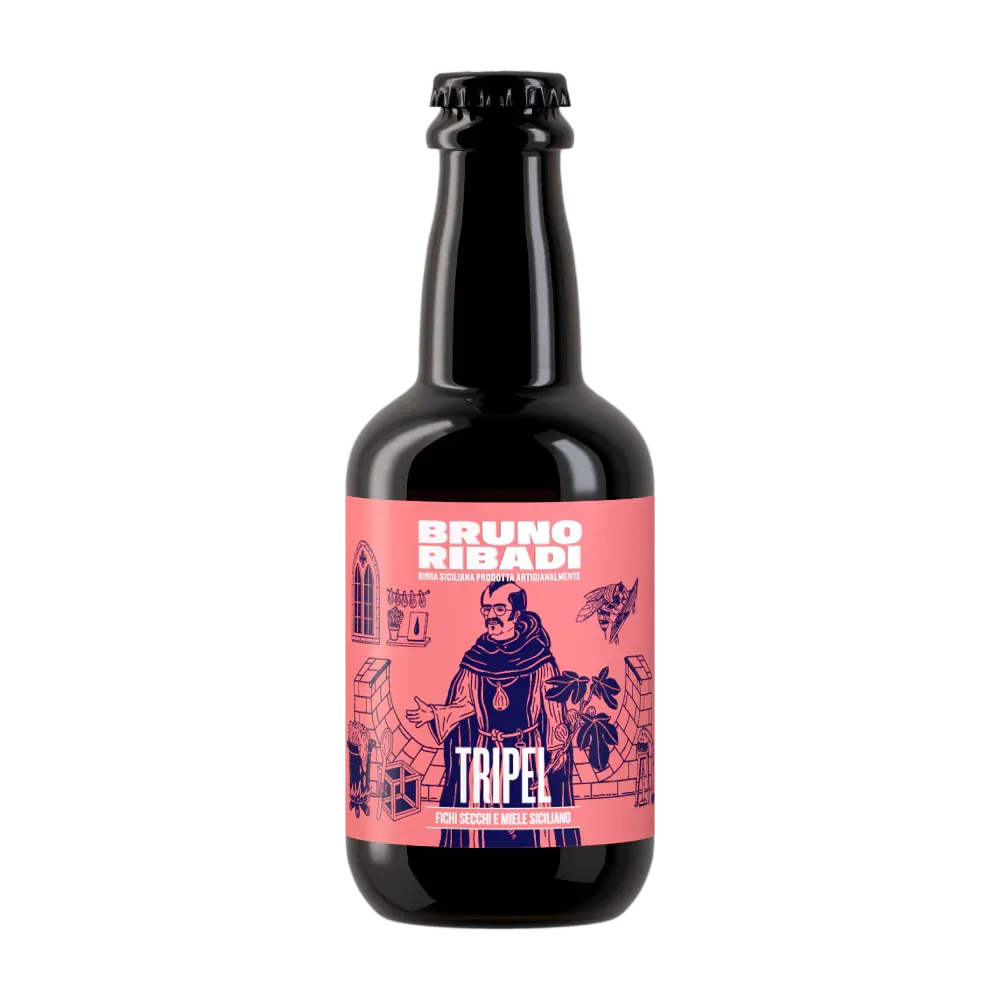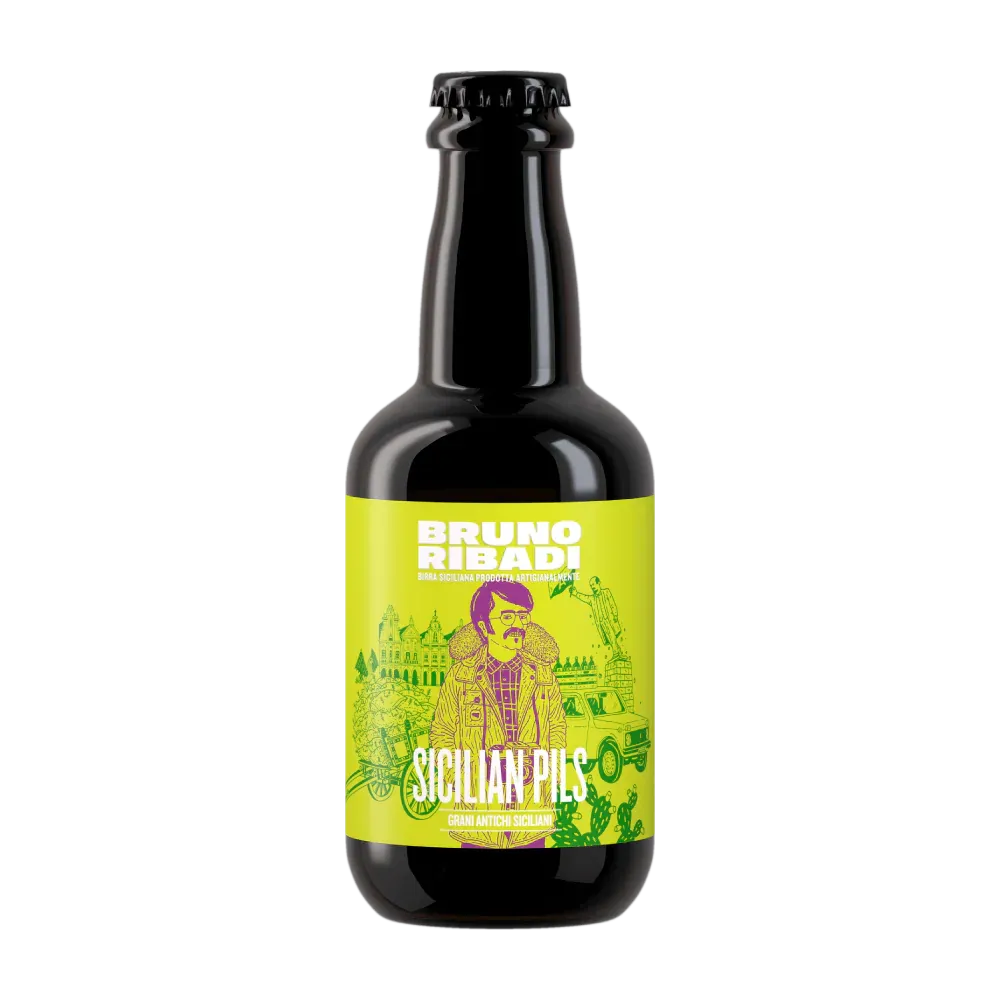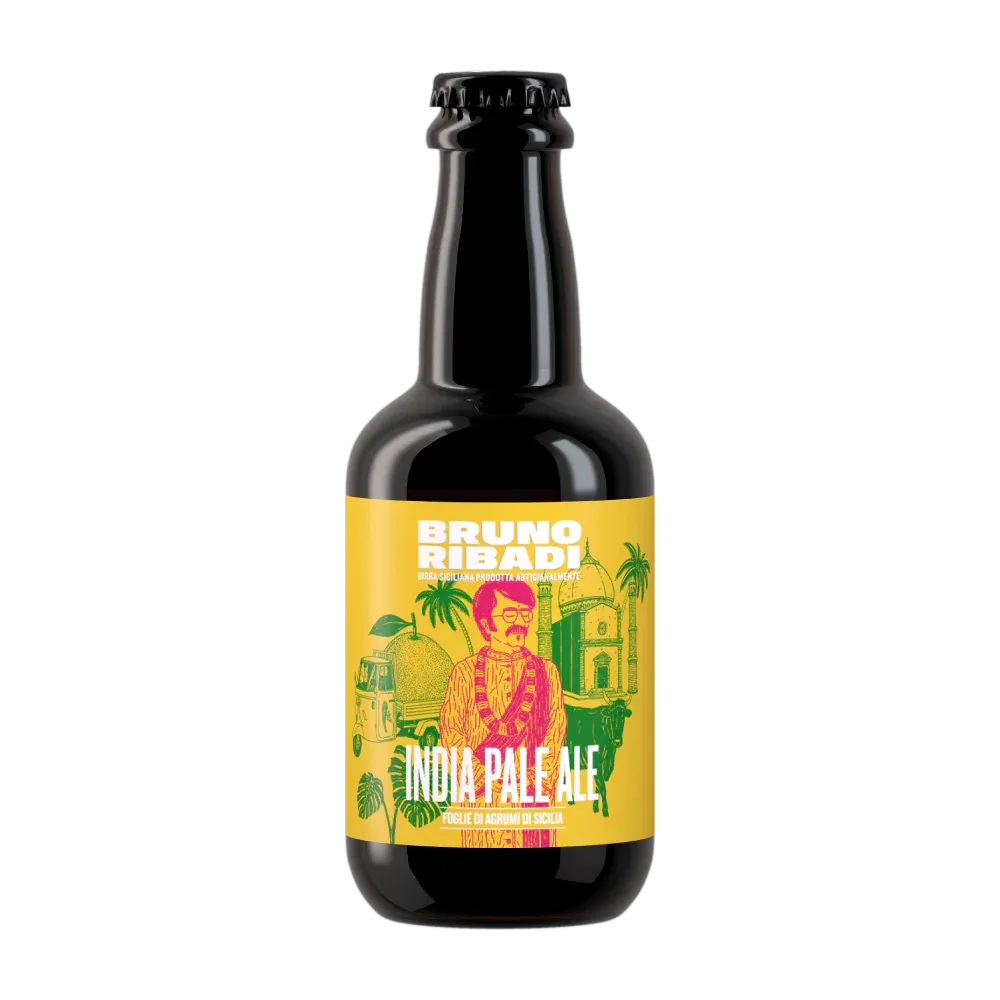On the Mediterranean’s largest island, where ancient civilizations left their mark in stone and soil, a new generation of brewers is channeling millennia of fermentation wisdom into Italy’s most audacious craft beer renaissance
The morning light illuminates Mount Etna’s snow-capped peak as it towers over vineyards that have thrived in volcanic soil for three millennia. At 1,800 meters above sea level, on the volcano’s northern slope where lava flows have carved natural terraces, brewmaster Giuseppe Russo draws water from a spring that emerges directly from basaltic rock. This water, filtered through centuries of volcanic activity, will become the foundation for what he calls “the most Sicilian beer possible.”
His brewery, Birra Etna, occupies a converted palmento overlooking the Alcantara Valley, where the contrast between ancient winemaking traditions and contemporary brewing innovation creates something entirely unprecedented. The beer fermenting in reclaimed wine barrels—a Barley Wine aged with Nerello Mascalese grape must—represents Sicily’s emerging identity as the Mediterranean’s most compelling craft beer destination.
“Sicily has been fermenting longer than anywhere else in the Mediterranean,” Russo explains, his voice carrying the melodic cadence of Sicilian dialect refined by years studying brewing science in Munich. “Greeks, Romans, Arabs, Normans—each civilization brought fermentation knowledge. We’re the inheritors of 3,000 years of liquid wisdom.”
This historical consciousness defines Sicily’s craft beer movement, transforming the island’s complex cultural heritage into contemporary brewing excellence that attracts international attention while remaining profoundly rooted in place.

Volcanic Advantage
Sicily’s geological foundation provides advantages that mainland brewers can only dream of. The island’s multiple volcanic systems—Etna, Stromboli, Vulcano—create diverse mineral profiles in groundwater that naturally enhance brewing potential. At Birrificio Messina, established in the shadow of the Peloritani Mountains, hydrogeologist Dr. Maria Catalano has mapped mineral variations that create distinct terroir zones across the island.
“Each volcanic system produces water with unique characteristics,” Catalano explains, examining samples from springs scattered across northeastern Sicily. “Etna water offers exceptional clarity with balanced minerality perfect for lagers. Stromboli’s springs provide higher sulfate content ideal for hoppy ales. We have natural water chemistry that brewers elsewhere spend fortunes trying to replicate.”
This geological diversity has attracted attention from international brewing consultants. When Carlsberg’s innovation team sought locations for experimental brewing, Sicily’s volcanic water convinced them to establish a research facility near Catania, where they study mineral interactions with heritage grain varieties found nowhere else in Europe.
The Grain Renaissance
Sicily’s role as the Roman Empire’s granary continues through heritage wheat varieties that survived in isolated mountain valleys while disappearing from more accessible regions. At Birra Sikania, housed in converted grain silos near Agrigento where Doric temples overlook almond groves, agricultural archaeologist turned brewmaster Dr. Lucia Greco has catalogued over thirty indigenous grain varieties with brewing potential.
“Industrial agriculture nearly eroded our genetic heritage,” Greco reflects, examining kernels of Tumminia wheat, a hardy variety with deep purple hue that thrives in Sicily’s arid interior. “But farmers in remote areas continued cultivating ancient varieties for family consumption. We’re rediscovering flavors that disappeared from commercial brewing centuries ago.”
Her Grano Antico series showcases single-varietal beers that reveal subtle differences between heritage wheats. The Tumminia Weizen offers notes of honey and herbs that mirror the wild fennel and capers growing in abandoned fields, while the Maiorca wheat ale provides nutty complexity that complements Sicily’s legendary sheep’s milk cheeses.

Arab Influence
Perhaps no aspect of Sicilian brewing reflects the island’s multicultural heritage more than the incorporation of spices and techniques introduced during Arab rule. At Birra Saracena in Palermo’s historic Kalsa quarter, brewmaster Ahmed Al-Mansouri—a Moroccan brewing scientist who settled in Sicily after falling in love with both the island and a local sommelier—has revived medieval brewing spices documented in Arab treatises.
“The Arabs were master fermenters,” Al-Mansouri explains, grinding coriander seeds, bitter orange peel, and wild mint in his brewery’s spice room. “They brought sophisticated flavor combinations that influenced Sicilian cuisine for a millennium. We’re applying that same sophistication to contemporary brewing.”
His Birra Arancina, named for Sicily’s beloved street food, incorporates saffron, cinnamon, and bitter orange—spices that arrived with Arab traders but became quintessentially Sicilian through centuries of culinary evolution. The beer has become essential pairing for modern Sicilian cuisine at restaurants from Palermo to Taormina.

Citrus Supremacy
Sicily’s citrus industry, the largest in Italy, provides craft brewers with ingredients that command premium prices in international markets. At Agrumeto Brewery near Syracuse, where ancient Greek amphitheaters overlook modern citrus groves, the Bellomo family has developed techniques for incorporating citrus oils from over twenty varieties of lemons, oranges, and exotic fruits like bergamot and chinotto.
“Each citrus variety has distinct aromatic compounds,” explains head brewer Valentina Bellomo, examining essential oils extracted from blood oranges whose deep crimson color reflects volcanic soil minerality. “Industrial brewing uses artificial citrus flavoring. We work with living fruit that changes with seasons, weather, and soil conditions.”
Her Sicilian Citrus IPA series features limited releases showcasing individual varieties: winter beers with blood orange, spring ales with lemon blossoms, summer saisons with bergamot. Each release sells out within days to collectors who understand that these flavors cannot be replicated anywhere else on earth.

The Pistachio Innovation
In Bronte, the town that produces the world’s finest pistachios in volcanic soil on Etna’s western slope, Birra Pistacchio has developed what may be Sicily’s most unusual brewing innovation. Brewmaster Carlo Strano, working with local pistachio farmers, has created techniques for incorporating pistachio oils and pastes into beer without the cloying sweetness that typically makes nut-flavored beers undrinkable.
“Bronte pistachios have complexity that other varieties lack,” Strano explains, examining the deep purple-skinned nuts that develop their distinctive flavor from volcanic soil. “The challenge is extracting subtle nutty notes while avoiding the heavy oils that would destroy beer’s refreshing character.”
His Pistacchio Porter, aged in Marsala wine barrels with toasted pistachio shells, offers layers of chocolate, vanilla, and subtle nuttiness that complement rather than overwhelm the base beer. The limited release has developed cult following among international beer collectors willing to pay premium prices for authentic Sicilian terroir expression.
Coastal Brewing
Sicily’s extensive coastline provides both inspiration and ingredients for innovative coastal brewing. At Birra Marina near Trapani, where ancient salt pans create landscapes of geometric beauty, brewmaster Giovanna Favuzza incorporates sea salt, samphire, and even filtered seawater into beers that capture the essence of Mediterranean coastal life.
“The sea defines Sicily,” Favuzza reflects, drawing samples from tanks that overlook salt pans where flamingos feed in waters that have been harvested for salt since Phoenician times. “Our ancestors were seafarers, traders, fishermen. Our beers should reflect that maritime heritage.”
Her Gose di Sicilia, brewed with sea salt from traditional salt pans and wild herbs gathered from coastal dunes, has become signature pairing for Sicilian seafood cuisine. The beer’s mineral salinity perfectly complements raw sea urchin, grilled swordfish, and the island’s legendary bottarga.

Mafia to Market
Sicily’s craft beer movement operates within a transformed social landscape where traditional power structures have given way to legitimate entrepreneurship. Several breweries have emerged from families making conscious decisions to build transparent businesses in regions where alternative economic models historically prevailed.
At Birra Libera (“Free Beer”) in Corleone—the town synonymous with organized crime—founder Piero Corsello has created a brewery explicitly committed to anti-mafia principles. His taproom displays partnerships with Libera Terra, the organization that manages lands confiscated from mafia bosses, and sources ingredients exclusively from ethical suppliers.
“We’re reclaiming our narrative,” Corsello states, pouring his flagship Legalità Lager. “Corleone means more than crime movies. We have incredible agricultural resources, hardworking people, and legitimate business opportunities. Craft beer becomes our symbol of renewal.”
The brewery’s success, particularly its export contracts with American distributors fascinated by the transformation story, demonstrates how craft brewing can provide legitimate economic opportunities while changing perceptions of Sicilian culture.
Cultural Integration
The sophistication of Sicily’s craft beer culture extends beyond production into gastronomy and tourism. At Osteria dei Vespri in Palermo, chef Alberto Rizzo has developed what may be Italy’s most comprehensive beer and Sicilian food pairing program, working exclusively with island brewers to create harmonious marriages between traditional Sicilian cuisine and contemporary ales.
“Sicilian cuisine is about layered complexity—Greek techniques, Arab spices, Norman richness, Spanish influences,” Rizzo explains, presenting a dish of pasta con le sarde paired with a wheat beer brewed with wild fennel and orange peel. “Our craft beers need the same complexity to complement rather than compete with these flavors.”
The restaurant’s success has inspired similar programs across the island, from the Greek temples of Agrigento to the Norman cathedrals of Cefalù. Sommeliers trained in wine are discovering beer’s potential to enhance Sicily’s extraordinary culinary heritage.
Export Excellence
International recognition of Sicilian craft beer quality has led to remarkable export growth. At Eataly locations worldwide, buyers report unprecedented demand for southern Italian craft beers, with Sicilian producers leading premium categories through unique ingredients and compelling cultural narratives.
“Sicily offers everything international markets want,” observes export manager Francesco Romano. “Authentic ingredients unavailable elsewhere, compelling stories rooted in history, and quality that rivals established brewing regions. Our volcanic terroir creates flavors that cannot be replicated.”
Export statistics support this enthusiasm. Sicilian craft beer exports increased 380% between 2020 and 2024, with particularly strong growth in Germany, where consumers appreciate technical excellence, and Japan, where citrus-infused beers complement traditional brewing aesthetics.
The New Sicily
As twilight approaches and the setting sun paints Etna’s peak in shades of gold and crimson—colors that will soon appear in tomorrow’s volcanic sunrise—Sicily’s craft brewers prepare for evening service. From Messina to Marsala, from mountain villages to coastal towns, each glass represents cultural transformation that honors the past while embracing the future.
The success of Sicilian craft beer lies in its practitioners’ understanding that island identity emerges from embracing rather than escaping complexity. By celebrating ingredients that make Sicily unique—volcanic water, heritage grains, ancient spices, incomparable citrus—they’ve created beverages that tell stories of resilience, creativity, and cultural synthesis.
“We’re not trying to make German lagers or Belgian ales,” reflects Giuseppe Russo, now preparing his evening service with Etna glowing in the distance. “We’re discovering what Mediterranean beer becomes when it embraces 3,000 years of cultural layering.”
On an island where Greek theaters still echo with ancient dramas, where Arab gardens perfume Norman cloisters, where volcanic soil nurtures vines planted by Roman settlers, this approach feels both inevitable and revolutionary. The craft beer movement in Sicily represents cultural renaissance expressed through liquid poetry—complex, sophisticated, and unmistakably rooted in the soil and soul from which it springs.
The island, it seems, has found its voice once again.
This article was researched with support from the Sicily Regional Tourism Department and the Consorzio Birra Artigianale Siciliana during extensive field work across the island’s diverse brewing regions.
